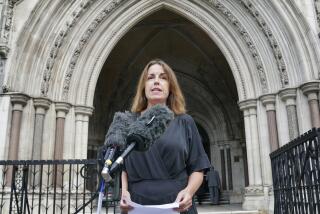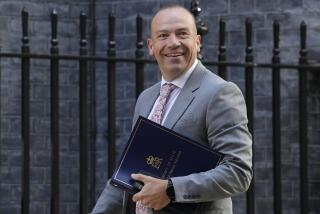Britain OKs Public Inquiry in ’89 Slaying
- Share via
LONDON — After 15 years of bitter arguments, Britain agreed Thursday to open a public inquiry into the assassination of Belfast attorney Patrick Finucane, who specialized in defending Irish Republican Army suspects.
Northern Ireland Secretary Paul Murphy confirmed that he would introduce legislation to establish a fact-finding commission to investigate allegations that intelligence officers with the Northern Ireland police and British army colluded with the killers. Roman Catholic politicians and Finucane’s family have long campaigned for an independent inquiry.
Finucane was shot 14 times in the head on Feb. 12, 1989, in front of his wife and three children as they sat down to eat in their home in Belfast, Northern Ireland.
Three special investigations led by John Stevens, now commander of London’s Metropolitan Police, have found that the British army and Northern Ireland police had agents and informers in the Ulster Defense Assn., the paramilitary group that claimed responsibility for the killing.
A Canadian judge, Peter Cory, presented Britain with reports in 2003 recommending that public inquiries into four cases, including Finucane’s, that involve alleged collusion between British security forces and outlawed groups.
Although Britain accepted Cory’s recommendations on the other three cases, it initially refused to open an inquiry into the slaying of Finucane because Belfast militant Ken Barrett was on trial for the lawyer’s murder.
Barrett last week pleaded guilty to murder and received a 22-year prison sentence. He probably will be freed from prison soon under the terms of Northern Ireland’s 1998 peace accord.
Barrett and Ken Stobie, the UDA member who admitted supplying the two handguns used to kill Finucane, were paid by police as informers. Stobie was killed by former UDA colleagues after being acquitted in 2001 of Finucane’s murder.
Barrett went to England, where he admitted -- first to a BBC reporter, then to undercover detectives -- that he was one of the gunmen who killed Finucane. Barrett claimed in the BBC interview that his police contacts encouraged him to kill Finucane.
More to Read
Sign up for Essential California
The most important California stories and recommendations in your inbox every morning.
You may occasionally receive promotional content from the Los Angeles Times.













